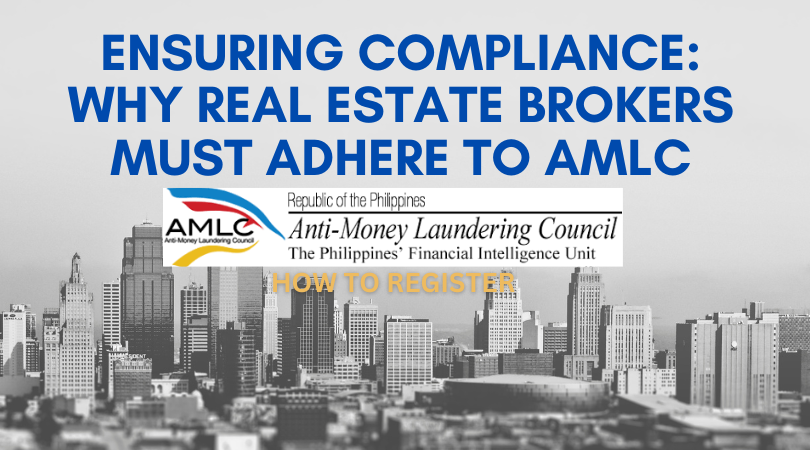Real estate brokers play a pivotal role in property transactions, facilitating deals and ensuring smooth exchanges between buyers and sellers. However, with the potential risk of illicit financial activities, it’s imperative for these professionals to uphold the standards set by the Anti-Money Laundering Council (AMLC) in the Philippines. Compliance with AMLC regulations not only safeguards the integrity of the real estate industry but also contributes to the country’s efforts in combating money laundering and terrorist financing.

Firstly, adherence to AMLC guidelines helps real estate brokers contribute to the global fight against financial crimes. By implementing due diligence procedures and verifying the identities of their clients, brokers can help prevent their services from being used for money laundering or other illegal activities. Furthermore, compliance promotes transparency and accountability within the industry, fostering trust among stakeholders and potential clients.
For real estate brokers aiming to register and comply with the AMLC in the Philippines, the process involves several key steps:
- Understanding AMLC Regulations: Brokers should familiarize themselves with the Anti-Money Laundering Act and the guidelines set by the AMLC. This includes knowing the reporting requirements and identifying suspicious transactions.
- Registration with the Anti-Money Laundering Council: Brokers need to register with the AMLC, which typically involves submitting an application form and supporting documents, such as proof of identity and business registration details. [Register here]
- Appointment of Compliance Officer: Designating a compliance officer within the brokerage firm is crucial. This individual will oversee and ensure that the company adheres to AMLC regulations, conducts due diligence, and reports any suspicious transactions.
- Implementation of AMLC Guidelines: Brokers must establish robust internal policies and procedures aligned with AMLC regulations. This includes customer due diligence, record-keeping, and reporting of suspicious transactions.
- Ongoing Training and Review: Continuous education and training for staff on AMLC compliance is essential. Regular reviews of internal procedures help ensure they remain updated and effective.

In conclusion, real estate brokers’ compliance with the Anti-Money Laundering Council in the Philippines is vital for maintaining integrity within the industry and contributing to the broader goal of preventing financial crimes. By understanding and adhering to AMLC regulations and following the steps for registration, brokers not only protect their businesses but also uphold the ethical standards of the profession while contributing to a more secure financial environment in the country.
HOW TO REGISTER WITH THE AMLC
- Register with the AMLC via the online registration system (ORS).
- Before proceeding with the registration, however, compliance officers (COs)/associated persons (APs)/primary designated officers (PDOs) must have document/s, showing their designation. For the list of documents, please refer to Part 2 of the Online Registration System of the AMLC Registration and Reporting Guidelines (ARRG). Document/s will be attached in the ORS, preferably in PDF file format. For designated non-financial businesses and professions (DNFBPs), which includes jewelry dealers, persons dealing with precious metals and stones, company service providers, lawyers, and accountants, please refer to Section 48 of the AML/CFT Guidelines for DNFBPs (DNFBP Guidelines) for the additional list of documentary requirements. While said requirements are being completed, a Provisional Certificate of Registration (PCOR) may already be issued if the registering DNFBP provides, at least, the following:a. Articles of Partnership/Incorporation/Department of Trade and Industry Certificate; b. Appointment of Compliance Officer/Primary Designated Officer; andc. Notarized Deeds of Undertaking (for the sample format, please refer to Annexes B and C of the DNFBP Guidelines).
- Covered persons’ CO/AP/PDO must create a key ID under their name in the GPG (Kleopatra) Software (optional for alternate officers) to be exported and attached in the online registration. Please refer to Part 3 of the Transaction Security Protocol of the ARRG for the procedure.
- Once items 2 and 3 have been accomplished, COs/APs/PDOs may now enter the AMLC Portal (https://portal.amlc.gov.ph) and proceed with the online registration.
- Please ensure the correct input of e-mail address/es in the ORS, which the system will verify, as registration approvals will be sent to said e-mail address/es. It must be noted that e-mail addresses of registered personnel must be distinct from each other.
- Registration applications are processed daily with a cut-off time of 1 p.m. Those received after 1 p.m. will be processed the following day.
- For inquiries or assistance, please contact the following Registration Staff personnel.
- +632 5 302 3848
[email protected] - +632 8 708 7067
[email protected]
- +632 5 302 3848
Official Website: http://www.amlc.gov.ph/




